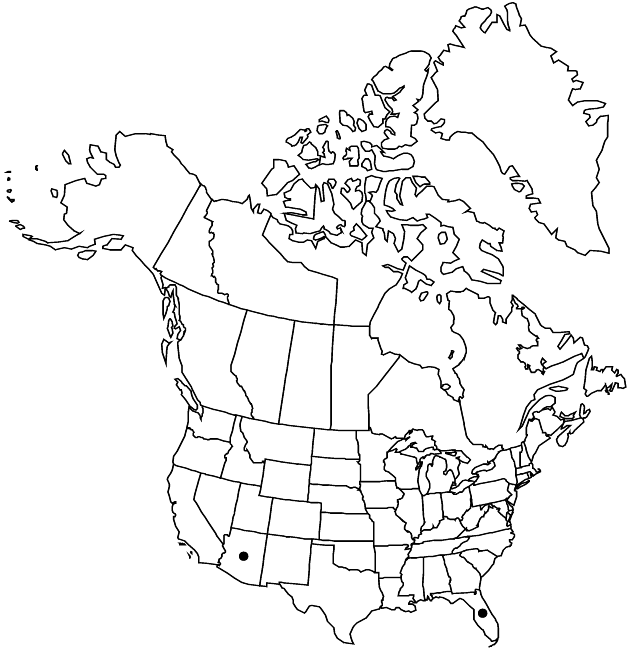Difference between revisions of "Pectis linifolia var. linifolia"
FNA>Volume Importer |
imported>Volume Importer |
||
| (6 intermediate revisions by 2 users not shown) | |||
| Line 1: | Line 1: | ||
{{Treatment/ID | {{Treatment/ID | ||
|accepted_name=Pectis linifolia var. linifolia | |accepted_name=Pectis linifolia var. linifolia | ||
| − | |accepted_authority= | + | |accepted_authority= |
|publications= | |publications= | ||
|basionyms= | |basionyms= | ||
|synonyms={{Treatment/ID/Synonym | |synonyms={{Treatment/ID/Synonym | ||
|name=Pectis linifolia var. marginalis | |name=Pectis linifolia var. marginalis | ||
| − | |authority= | + | |authority= |
| − | }}{{Treatment/ID/Synonym | + | |rank=variety |
| + | }} {{Treatment/ID/Synonym | ||
|name=Pectis punctata | |name=Pectis punctata | ||
| − | |authority= | + | |authority= |
| + | |rank=species | ||
}} | }} | ||
|hierarchy=Asteraceae;Asteraceae tribe Heliantheae;Asteraceae (tribe Heliantheae) subtribe Pectidinae;Pectis;Pectis linifolia;Pectis linifolia var. linifolia | |hierarchy=Asteraceae;Asteraceae tribe Heliantheae;Asteraceae (tribe Heliantheae) subtribe Pectidinae;Pectis;Pectis linifolia;Pectis linifolia var. linifolia | ||
| Line 25: | Line 27: | ||
|elevation=100–1200 m | |elevation=100–1200 m | ||
|distribution=Ariz.;Fla.;Mexico;West Indies;Central America;South America;Pacific Islands (Galapagos Islands;Hawaii). | |distribution=Ariz.;Fla.;Mexico;West Indies;Central America;South America;Pacific Islands (Galapagos Islands;Hawaii). | ||
| − | |discussion=<p>Pectis linifolia is widespread with disjunctions among populations. Most of it is attributable to the widespread var. linifolia. Variety hirtella S. F. Blake is known only from southern Mexico. The wide distribution of var. linifolia is probably attributable to its adaptations for animal dispersal. The cypselae and spreading pappus awns resemble tiny grappling hooks. Field observations indicate that the cypselae readily cling to fabrics, and presumably they cling equally well to feathers and fur. The plants are autogamous and a single long-distance dispersal event is probably sufficient to establish a new population.</p> | + | |discussion=<p><i>Pectis linifolia</i> is widespread with disjunctions among populations. Most of it is attributable to the widespread <i></i>var.<i> linifolia</i>. Variety hirtella S. F. Blake is known only from southern Mexico. The wide distribution of <i></i>var.<i> linifolia</i> is probably attributable to its adaptations for animal dispersal. The cypselae and spreading pappus awns resemble tiny grappling hooks. Field observations indicate that the cypselae readily cling to fabrics, and presumably they cling equally well to feathers and fur. The plants are autogamous and a single long-distance dispersal event is probably sufficient to establish a new population.</p> |
|tables= | |tables= | ||
|references= | |references= | ||
| Line 34: | Line 36: | ||
-->{{#Taxon: | -->{{#Taxon: | ||
name=Pectis linifolia var. linifolia | name=Pectis linifolia var. linifolia | ||
| − | + | |authority= | |
| − | |authority= | ||
|rank=variety | |rank=variety | ||
|parent rank=species | |parent rank=species | ||
| Line 49: | Line 50: | ||
|publication year= | |publication year= | ||
|special status= | |special status= | ||
| − | |source xml=https:// | + | |source xml=https://bitbucket.org/aafc-mbb/fna-data-curation/src/2e0870ddd59836b60bcf96646a41e87ea5a5943a/coarse_grained_fna_xml/V19-20-21/V21_559.xml |
|tribe=Asteraceae tribe Heliantheae | |tribe=Asteraceae tribe Heliantheae | ||
|subtribe=Asteraceae (tribe Heliantheae) subtribe Pectidinae | |subtribe=Asteraceae (tribe Heliantheae) subtribe Pectidinae | ||
Latest revision as of 20:13, 5 November 2020
Annuals, 10–100 cm; herbage unscented. Stems erect or ascending, glabrous. Leaves linear to linear-elliptic, 20–60 × 1–4.5 mm, margins with 0–1 pairs of setae, faces glabrous (abaxial dotted with scattered or marginal oil-glands, adaxial often with 1 elongate, medial, subterminal oil-gland). Heads borne singly or in diffuse, cymiform arrays. Peduncles 10–30 mm. Involucres cylindric. Phyllaries distinct, linear, 4.5–7.5 × 0.5 mm (dotted submarginally with linear-elongate to elliptic oil-glands and subapically with 1+ elliptic oil-glands). Ray florets 5; corollas 2–3 mm. Disc florets 1–3; corollas 2–3.5 mm (lobes 5, equal, 4 or 5 each with 1 round oil-gland, throats sometimes with additional oil-glands). Cypselae 3.5–5 mm, strigillose or hirtellous (ray cypselae and subtending phyllaries widely spreading at maturity with pappi projecting downward); pappi of 1–4 stiff, often divaricate, awns 2–3 mm. 2n = 24.
Phenology: Flowering Aug–Dec.
Habitat: Desert scrub, arid grasslands
Elevation: 100–1200 m
Distribution

Ariz., Fla., Mexico, West Indies, Central America, South America, Pacific Islands (Galapagos Islands, Hawaii).
Discussion
Pectis linifolia is widespread with disjunctions among populations. Most of it is attributable to the widespread var. linifolia. Variety hirtella S. F. Blake is known only from southern Mexico. The wide distribution of var. linifolia is probably attributable to its adaptations for animal dispersal. The cypselae and spreading pappus awns resemble tiny grappling hooks. Field observations indicate that the cypselae readily cling to fabrics, and presumably they cling equally well to feathers and fur. The plants are autogamous and a single long-distance dispersal event is probably sufficient to establish a new population.
Selected References
None.